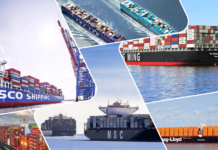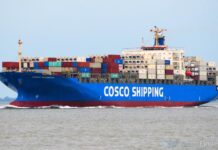
A group of industry bodies have banded together to produce guidance on some surprising,
and some less surprising, hazardous cargoes that could save lives, the environment and
unnecessary cost.
The Cargo Integrity Group (CIG) brings together seven maritime, port, cargo and insurance
interests in an effort to reduce the number of incidents that can occur due to badly packed
or handled freight, either at sea, in port or on inland delivery.
The list is divided into the various types of hazard that they represent, including fire and
explosive risks, spills and leaks, and improper packing. CIG They emphasised that these
cargoes of concern are far more likely to pose a danger when they are mis-declared or have incomplete or incorrect information about their identity.
Much of the list is compiled from the freight insurer TT Club and a report by the
International Cargo Handling Co-ordination Association (ICHCA) which was recently
submitted to the IMO and from the Cargo Incident Notification System (CINS) which collates information from shipping lines on such incidents.
“The combined experience of our organisations has been harnessed to identify these categories and result in pin-pointing some commodities where the risks are perhaps
less obvious,” said Peregrine Storrs-Fox, Risk Management Director, TT Club.
Storrs-Fox added that some of the freight on the list have seen well documented incidents,
but others, such as “the combustible qualities of seed cake or the hazards associated with
cocoa butter or vegetable oils, will be less well-known.”
Global Shippers’ Forum director James Hookham told Posidonia Today: “Seed cake is a
natural product that can self-heat and eventually burn through bacterial action. A bit like a
garden compost heap.”
For this reason, it must be transported in the manner and conditions that prevent it from
heating.
“You wouldn’t think it looking at it and given its use as feed for livestock you would think it
harmless, but cases have been reported of spontaneous self-heating in containers leading to loss of the load and the need for cooling and fire-fighting measures. Hence our concern,
added Hookham.
Every player in the supply chain has a responsibility to those further along the line for their
health and safety, so it is incumbent on each player to ensure that their cargo is properly
listed, packed and stowed.
“Complying with regulations and following the advice in the CTU Code saves lives, and we
appeal to everyone shipping, packing and handling commodities that fall within the
categories of these cargoes of concern to be particularly diligent,” advised Lars Kjaer, Senior Vice President at the World Shipping Council.
Reactive Hazards – These cargoes can catch fire and cause significant damage and casualties under certain conditions. They are generally subject to Dangerous Goods regulations. Examples are:
– Charcoal / carbon
– Calcium Hypochlorite
– Lithium-ion batteries
– Cotton and wool
– Fishmeal and krill
– Seed cake
Spill or Leak Risks – These commodities can present a risk if not packed properly or if they
are damaged. Spills or leaks from these cargoes can harm the health of people cleaning up
the spill as well as the environment. Examples are:
– Hides and skins
– Wine
– Bitumen
– Cocoa butter
– Waste – recycled engines and engine parts
– Vegetable and other oils, particularly when packed in flexitanks
Improper Packing Consequences – Cargoes that are poorly or incorrectly packed or secured
in the container can lead to injuries to personnel or damage to nearby containers, property,
or other cargo. Such incidents can cause severe accidents at sea or on land, such as truck
rollovers and train derailments. Examples are:
– Logs and timber
– Steel coils
– Marble and granite
Mary Ann Evans
Correspondent at Large




